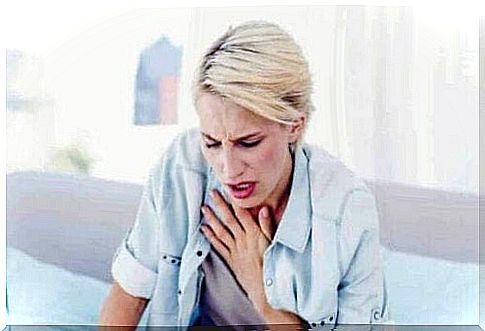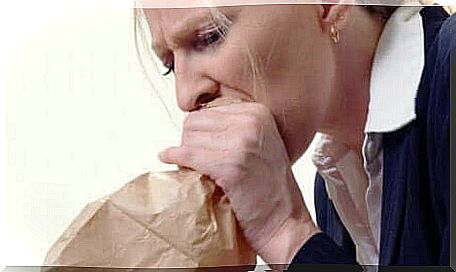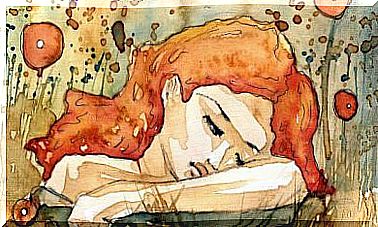What Is The Connection Between Hyperventilation And Anxiety?

Difficulty breathing, palpitations, dizziness, numbness, pressure over the chest, fear… Hyperventilation and anxiety are closely related. Shortness of breath and the feeling of not getting enough oxygen in the lungs can be a horrible experience. It can also be a direct result of some mental disorders, which many people are unaware of.
Not everyone connects this experience with anxiety. People generally think they have asthma or some other heart or breathing problem. But if you go to an emergency room or see your doctor and you do not discover any physical causes, this can make you confused. How is it then that anxiety can lead to something so painful?
You may forget that this mechanism, which is there to prepare you for external and internal stimuli, is directly linked to breathing. The most important task of the body when you experience anxiety is to react to it. It does this by raising your heart rate and increasing the supply of oxygen to your muscles. The goal is simple: to escape the wild animals that are chasing you.
Remember that hyperventilation is not a disease. It’s not something serious and you can not die from it. It is a side effect of anxiety that people with panic disorder often suffer from. Let’s take a closer look at this.

Hyperventilation and anxiety: symptoms, characteristics and strategies
Anxiety is one of the clinical conditions that causes the most physical symptoms. Studies conducted at the University of Health Sciences at Chicago Medical School show that being particularly sensitive to anxiety usually constitutes a risk factor for panic disorder and thus also for hyperventilation.
It is important to note that hyperventilation and the experience of shortness of breath can of course be signs of other disorders that are not emotionally conditioned. Asthma, emphysema and other lung problems can also explain why breathing difficulties of this type suddenly occur. In any case, the best thing to do is to consult your doctor to get the correct diagnosis.
Why do you hyperventilate when you feel anxious?
When you breathe faster than necessary to supply the body with the oxygen it needs, this leads to hyperventilation. As you probably understand, this is something that happens in stressful situations or when your anxiety increases or reaches uncontrollable levels. You do not realize that you are breathing too fast and that you are creating an imbalance in your oxygen levels.
- Hyperventilation upsets the balance between oxygen and carbon dioxide.
- Your brain perceives the sudden decrease in carbon dioxide in the blood as a threat.
- The brain strives to stabilize the situation by reducing the amount of inhaled oxygen and exhaled carbon dioxide as quickly as possible.
- Your body does this by reducing the impulse to breathe. This means that your brain signals that your breathing should slow down, which explains why you have the feeling of suffocation.
- While you are desperately trying to breathe, this is something that your body is actually making it difficult. Naturally, the effect is that your panic and anxiety intensify.
While it is true that hyperventilation is not dangerous and no one has died from it, it is a very frightening experience.
Symptoms of hyperventilation and anxiety
Hyperventilation and anxiety are closely related. When your emotional load is high, your body reacts. As a rule, the physiological response is intense.
The most difficult thing about these situations is that the experience of panic disorder or hyperventilation only strengthens the fear and anxiety. It will be a vicious circle. Below are the most common signs of this cycle of hyperventilation and anxiety:
- Hyperventilation caused by anxiety usually lasts about 20 minutes.
- You feel an increased physical and emotional tension.
- It can give you the experience of not being able to breathe, as if you have suffered from shortness of breath. The feeling of being suffocated gradually intensifies.
- Your heart beats faster and harder.
- You may feel tingling in your hands, legs and around your mouth.
- Dizziness and tunnel vision are common symptoms.
- Sweating.
- Headaches and fainting spells are also common.

How to counteract hyperventilation
When you hear the word hyperventilation, you are probably imagining a person breathing in a paper bag. This is actually a good strategy, but there are other aspects to consider as well.
- Hyperventilation is not a disease. It is a symptom and it is important to know its origin. As a first step, physical health problems should be ruled out.
- If it is anxiety that is behind your hyperventilation, try to identify what triggers your anxiety.
- Cognitive behavioral therapy, rational emotional behavioral therapy, cognitive therapy focused on solutions for hyperventilation or eye movement therapy (EMDR therapy, from the English Eye Movement Desensitization and Reprocessing ) can all give good results.
- At the same time, it is important that you focus on your breathing when you suffer from a hyperventilation attack.
- If you breathe faster, the feeling of suffocation will be stronger. Instead, you need to reduce your oxygen intake.
- It may help to breathe with pursed lips, as if you were blowing out a candle.
- There is also another strategy that you can try. Close one nostril and breathe through the other. This is another effective way to breathe more slowly.
Finally, you can always use the classic paper bag technology. All you need to do is hold the bag for your nose and mouth and start breathing. This helps to slow down your breathing and to balance your carbon dioxide levels. In conclusion, it is important that you find out what triggers your breathing difficulties and that you seek help.








